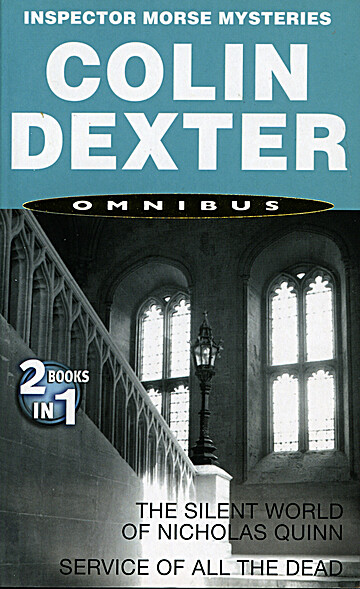
This week’s letter is D in Kerrie’s Crime Fiction Alphabet series and I’ve chosen to feature Colin Dexter’s The Silent World of Nicholas Quinn, the third Inspector Morse book first published in 1977.
For years I’ve been watching and enjoying Inspector Morse on TV. We used to live not far from Oxford and one of the pleasures of watching the series was identifying the locations. One evening we went with a group of friends on a Morse pub tour, (organised by ourselves) visiting a few of the pubs featured in the books – one of our favourites used to be The Trout Inn at Wolvercote, before it was renovated when you could get an old fashioned Sunday Roast, with waiter service.

I don’t remember seeing an episode of The Silent World of Nicholas Quinn, so apart from visualising John Thaw and Kevin Whately as Morse and Lewis I was free to see the novel through Colin Dexter’s words. My copy is a secondhand book – an Omnibus containing Service of All the Dead as well as The Silent World of Nicholas Quinn.
Description from the back cover:
Morse had never ceased to wonder why, with the staggering advances in medical science, all pronouncements concerning times of death seemed so disconcertingly vague.
The newly appointed member of the Oxford Examinations Syndicate was deaf, provincial and gifted. Now he is dead . . .
And his murder, in his north Oxford home, proves to be the start of a formidably labyrinthine case for Chief Inspector Morse, as he tries to track down the killer through the insular and bitchy world of the Oxford Colleges . . .
My View
I thoroughly enjoyed reading this book. As the blurb on the back cover indicated the time of Quinn’s death is of prime importance, but then so is the place of his death. His deafness, as I expected is also crucial. Morse and Lewis come across as well defined characters, and so do all the other characters – Quinn’s colleagues and neighbours. The setting, as I expected, is excellent, but then I am familiar with Oxford.
For a long time when reading I had little idea who the culprit was. It has a most complicated plot that kept me guessing right to the end. It’s one of those books that I want to start again as soon as I finished it to see just which clues I’d missed. Morse, himself, was baffled too but eventually worked it out successfully, whilst Lewis struggled to catch up with his train of thought, as this extract shows:
(Morse speaking first) ‘Remember this, then: Quinn couldn’t hear what he didn’t see.’
‘Am I supposed to see why all that is important, sir?’
‘Oh, yes. And you will do, Lewis, if only you think back to the Friday when Quinn was murdered.’
‘He was definitely murdered on the Friday, then?’
‘I think if you pushed me I could tell you to within sixty seconds!’ He looked very smug about the whole thing and Lewis felt torn between the wish to satisfy his own curiosity and a reluctance to gratify the chief’s inflated ego even further. Yet he thought he caught a glimpse of the truth at last … Yes, of course. Noakes had said … He nodded several times, and his curiosity won.
‘What about all the business at the cinema, though? Was that all a red herring?’ (pages 243-4)
Reading the book I realised that Colin Dexter not only knows Oxford very well (which wasn’t news to me!) but also was very familiar with the workings of an Examination Board and understood the difficulties of lip-reading. The reason for this is that after being a teacher, because of his deafness he became the Senior Assistant Secretary at the University of Oxford Delegacy of Local Examinations (UODLE) in Oxford, just like Quinn.